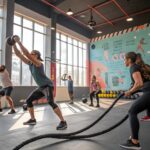Introduction
In a world that constantly demands more, Unleash Your Potential: How Exercise Can Boost Confidence and Energy isn’t just a catchy phrase—it’s a scientifically proven pathway to a happier, more productive life. By integrating consistent movement into your daily routine, you can activate powerful hormones, sharpen mental focus, and transform how you feel about yourself, paving the way for unstoppable confidence and boundless energy.
Why Physical Activity Is a Confidence Catalyst
Neurochemical Upswing: The Brain’s Reward System
Exercise triggers the release of endorphins, dopamine, and serotonin—neurochemicals that act as natural mood elevators. When you finish a workout, these “feel‑good” messengers flood your bloodstream, creating an immediate sense of accomplishment and positivity. Over time, the brain rewires itself to anticipate these rewards, making you more resilient to stress and self‑doubt.
Visible Progress Fuels Self‑Belief
Seeing tangible improvements—whether it’s a stronger squat, a faster mile, or a slimmer silhouette—provides concrete proof of your capability. This visual feedback reinforces a growth mindset, where you begin to view challenges as opportunities rather than obstacles. Each milestone, no matter how small, builds a cumulative bank of self‑esteem that propels you forward in all areas of life.
Energy Amplification: How Exercise Fuels Everyday Vitality

Metabolic Boost: From Resting to Revved Up
During physical activity, your muscles demand more oxygen, prompting your heart to pump faster and your lungs to work harder. This acute increase in oxygen delivery improves the efficiency of your mitochondria—the powerhouses of cells—resulting in a higher basal metabolic rate. Even after the workout, your body continues to burn calories at an elevated pace, a phenomenon known as excess post‑exercise oxygen consumption (EPOC), leaving you energized long after the sweat dries.
Improved Sleep Quality: The Silent Energy Provider
Regular aerobic and resistance training help regulate circadian rhythms, making it easier to fall asleep and achieve deeper REM cycles. High‑quality sleep is essential for hormone balance, particularly cortisol and growth hormone, both of which influence daytime alertness. When you rest better, you wake up refreshed, mentally sharp, and physically ready to tackle the day’s demands.
Stress Reduction: Protecting Your Energy Reservoir
Chronic stress depletes mental and physical energy by keeping the body in a constant state of “fight or flight.” Exercise acts as a physiological stress valve, reducing cortisol levels and stimulating the parasympathetic nervous system. The result is a calmer mind, calmer heart rate, and a sustainable level of energy that doesn’t crash midway through your schedule.
Designing an Exercise Routine That Maximizes Confidence and Energy
Balanced Split: Combining Cardio, Strength, and Flexibility
A well‑rounded program should include three pillars:
-
- Cardiovascular training (e.g., brisk walking, cycling, HIIT) improves heart health and stamina, directly influencing daily energy.
-
- Strength training (e.g., weightlifting, bodyweight circuits) builds muscle mass, which boosts metabolism and provides a visual sense of progress that fuels confidence.
-
- Flexibility and mobility work (e.g., yoga, dynamic stretching) sharpens posture, reduces injury risk, and enhances body awareness.
When each component is present at least twice a week, you create a synergistic effect that accelerates both confidence and energy levels.
Progressive Overload: The Secret to Ongoing Gains
To keep your brain and muscles responding, you must gradually increase the difficulty of your workouts. This can be achieved by adding weight, increasing repetitions, extending duration, or shortening rest intervals. The sensation of surmounting progressively harder challenges cements a belief in personal growth, reinforcing confidence while simultaneously taxing the body enough to stimulate energy‑producing adaptations.
Time Management Strategies for Busy Lifestyles
If you think you lack time, consider these efficient formats:
-
- Micro‑workouts: 5–10 minute bursts of activity sprinkled throughout the day (e.g., stair climbs, desk push‑ups).
-
- Tabata HIIT: 4‑minute cycles (20 seconds on, 10 seconds off) that deliver cardio and strength benefits in a short window.
-
- Compound movements: Squats with shoulder press, lunges with bicep curls—multiple muscle groups at once, maximizing return on time invested.
Consistent small doses often produce better long‑term adherence than sporadic marathon sessions, ensuring your confidence and energy keep climbing.
Psychological Benefits: From Self‑Perception to Social Presence
Body Image Reinforcement
When you engage in regular exercise, your relationship with your body transforms from one of judgment to appreciation. You start noticing functional abilities—how you can lift, run, or stretch—rather than just aesthetic metrics. This functional focus diminishes negative self‑talk and replaces it with a narrative of empowerment, a critical driver of confidence.
Social Connectivity and Accountability
Group classes, sports leagues, or even virtual workout communities add a social dimension that amplifies motivation. The shared experience of sweating together creates bonds, and the public commitment to a schedule strengthens accountability. Positive feedback from peers reinforces self‑esteem, while the sense of belonging contributes to overall mental vigor.
Goal‑Setting Mastery
Exercise naturally incorporates SMART (Specific, Measurable, Achievable, Relevant, Time‑bound) goals. By consistently achieving these targets—say, running a 5K in under 30 minutes—you internalize a proven method for success that can be transferred to career projects, academic pursuits, or personal hobbies. The confidence derived from mastering goal‑setting in fitness spills over into every domain, creating a virtuous cycle of accomplishment.
Long‑Term Lifestyle Integration: Making the Gains Permanent

Habit Stacking: Pairing Exercise with Existing Routines
One of the most effective ways to cement movement into daily life is to “stack” it onto an already established habit. For example, perform a 5‑minute stretch routine immediately after brushing your teeth each morning, or do a quick set of squats while waiting for your coffee to brew. This reduces decision‑fatigue and makes the workout feel like a natural extension of your day.
Tracking Progress with Data‑Driven Tools
Utilize wearable technology or mobile apps to log workouts, heart‑rate zones, and mood changes. Data visualizations offer concrete evidence of improvement, reinforcing confidence each time you see a trend upward. Moreover, tracking energy levels alongside exercise intensity can help you finetune the optimal training load for maximum vitality.
Mind‑Body Integration: Combining Exercise with Mental Practices
Adding mindfulness, breathing exercises, or meditation to your post‑workout cool‑down deepens the neurochemical benefits already earned during physical exertion. Practicing gratitude for what your body accomplished can amplify the confidence boost, while deep diaphragmatic breathing restores the parasympathetic system, ensuring you finish each session feeling energized rather than depleted.
Nutrition as the Fuel for Confidence & Energy
Even the best workout plan falters without proper nutrition. Prioritize a balanced intake of protein (for muscle repair), complex carbohydrates (for sustained energy), healthy fats (for hormone production), and micronutrients (for cellular function). Hydration is equally vital; dehydration can mimic fatigue and erode mood stability, undermining the confidence gains achieved through exercise.
Periodic Reassessment and Adaptation
Every 8–12 weeks, review your fitness metrics, mood logs, and energy assessments. Ask yourself: “Am I feeling more confident?” “Has my daily stamina improved?” If the answer is no, adjust variables—intensity, workout type, rest days, or nutritional timing. This reflective loop keeps your routine aligned with evolving goals, ensuring that the confidence and energy you earn are sustainable for the long haul.
By recognizing that exercise is more than calorie burning—it is a potent catalyst for confidence and a renewable source of energy—you can deliberately design a lifestyle that continuously unleashes your full potential. Start small, stay consistent, track your wins, and watch as your self‑belief and vitality skyrocket, transforming every facet of your personal and professional life.




